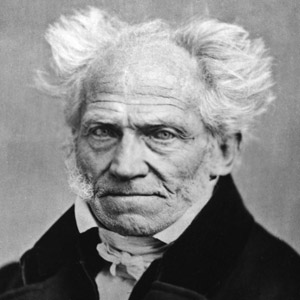
Arthur Schopenhauer (1788 – 1860) was a German philosopher who was born in the city of Danzig. He is best known for his 1818 work The World as Will and Representation, which he expanded in 1844. He was often referred to as “the philosopher of pessimism,” although the focus of his work was on finding a way to find to overcome the fundamentally painful human condition. Schopenhauer was among the first thinkers in Western philosophy to share and affirm significant tenets of Eastern philosophy, having initially arrived at similar conclusions as the result of his own philosophical work. His writing on aesthetics, morality, and psychology have influenced thinkers and artists throughout the 19th and 20th centuries.

Quotes by Arthur Schopenhauer…
There is no reason for despair. You need not fancy it is impossible to regulate your life in accordance with abstract ideas and maxims… the first thing to do is to understand the rule; the second thing is to learn the practice of it. The theory may be understood at once by an effort of reason, and yet the practice of it acquired only in the course of time.
There is one thing that, more than any other, throws people absolutely off their balance — the thought that you are dependant upon them. This is sure to produce an insolent and domineering manner towards you… they soon come to fancy that they can take liberties with you, and so they try to transgress the laws of politeness. This is why there are so few people with whom you care to become more intimate, and why you should avoid familiarity with shallow people.
Gradual practice makes him perfect, through a long series of slips, blunders, and fresh starts. It is just the same as in other things you learn.
It is natural for great minds — the true teachers of humanity — to care little about the constant company of others, just as little as the schoolmaster cares for joining in the frolic of the noisy crowd of boys which surrounds him. The mission of these great minds is to guide mankind over the sea of error to the harbor of truth, to draw men back from the dark abyss of barbarous crudeness into the light of culture and refinement.
Our life is like a journey in which, as we advance, the landscape takes a different view from that which is presented at first, and changes again, as we come nearer. This is just what happens, especially with our desires. We often find something else, no, something better than what we were looking for… Instead of finding, as we expected, pleasure, happiness, joy, we get experience, insight, knowledge — a real and permanent blessing, instead of a disappearing and illusory one. In their search for gold, the alchemists discovered other things — gunpowder, china, medicines, the laws of nature. There is a sense in which we are all alchemists.
The present alone is true and actual; it is the only time which possesses full reality, and our existence lies in it exclusively. Therefore we should always be glad of it, and give it the welcome it deserves, and enjoy every hour.
You must have patience. He who can see truly in the midst of general infatuation is like a man whose watch keeps good time, when all clocks in the town in which he lives are wrong. He alone knows the right time.
Simplicity, therefore, will contribute to happiness… Our existence will glide on peacefully like a stream which no waves or whirlpools disturb.
The social impulse does not rest directly upon the love of people, but upon the fear of solitude. It is not just the charm of having the company of others that people seek; it is the dreary oppression of being alone — the monotony of their own consciousness — that they would avoid. They will do anything to escape it, even put up with bad companions, and tolerate the feeling of restraint which all society involves, which is very burdensome.
Himself is the source of the best and most a man can be or achieve. The more this is so — the more a man finds his sources of pleasure in himself — the happier he will be… For all other sources of happiness are in their nature most uncertain.
